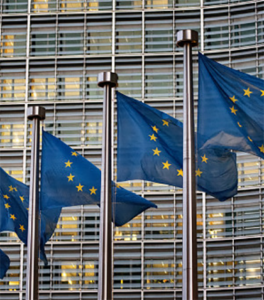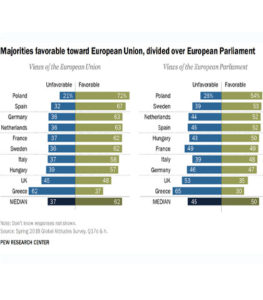EU a promoter of peace and prosperity – study finds
Most Europeans credit the European Union with promoting peace and prosperity since World War II but are less happy with the European Parliament, a new study has found.
Despite Brexit, the turmoil associated with events such as the European debt crisis, a massive influx of refugees and fragmenting politics across continental Europe, most Europeans  and including Britons still see value in the European experiment.
and including Britons still see value in the European experiment.
A survey of people in ten EU nations conducted by the Washington-based think tank, the Pew Research Center, found that most people continue to believe the EU stands for noble goals.
Across all countries surveyed about 74 per cent say the EU promotes peace, and most also think it promotes democratic values and prosperity.
But Europeans also think of Brussels as inefficient and intrusive and they believe the EU is out of touch.
Around 62 per cent say it does not understand the needs of its citizens.
The Pew Center survey found many people worried about the economic future with about 58 per cent believing that when children in their country grow up, they will be worse off financially than their parents; only 30 per cent think they will be better off.
The survey also found strong concerns about immigration in some countries.
Majorities in most nations want fewer immigrants allowed into their country. Many believe that immigrants tend to remain distinct from the broader culture and that immigration increases the risk of terrorism.
The survey also found that views about the EU and the challenges facing Europe vary in important ways across the nations.
And as May elections for the European Parliament approach, attitudes toward the EU-wide legislative body are mixed, although overall ratings are slightly more favourable (a median of 50 per cent) than unfavourable (45 per cent).
The UK and Greece stand out for their negative assessments, while Germans and the French are almost evenly divided.
Within nations, views about the EU diverge along ideological and demographic lines, with young people and those on the political left offering more positive opinions.
Negative views are more common among supporters of right-wing populist parties.
“For example, 62 per cent of Germans with a positive opinion of Alternative for Germany (AfD) express an unfavourable opinion of the EU, compared with just 29 per cent of those who rate AfD negatively,” the Pew Center report said.
“In Spain, supporters of the left-wing populist party Podemos are also particularly likely to give the EU a negative rating.
“However, those with positive views of left-wing populist parties in France (La France Insoumise) and Greece (Syriza) are more likely to have a favourable opinion of the EU,” the report said.
It says “a remarkable” number of Europeans believe the financial situation for average people in their country has not improved over the past two decades.
“In Greece, Italy and Spain – three southern European nations hit hard by the financial crisis – large majorities say average people are worse off than they were 20 years ago,” the report said.
“And roughly half or more share this view in France and the UK. Two notable exceptions are Poland and Sweden, where about two-in-three believe people are generally better off financially,” is said.
The study found a strong desire in many countries for less immigration – roughly seven-in-ten or more want fewer immigrants in Greece, Hungary and Italy.
This view is less common in France, the Netherlands, the UK and Spain, where roughly four-in-ten or fewer say they want less immigration.
Public concerns about immigration often centre on culture and a perceived link to terrorism, the report said.
Across the ten nations surveyed, about 51 per cent believe immigrants want to remain distinct from the broader society, while 38 per cent think they want to adopt the nation’s customs and way of life, it said.
Around 57 per cent of everyone surveyed said immigration increased the risk of terrorism in their country, while 38 per cent believe it does not.
Many people did see the value of immigration, including the view that immigrants make their country stronger through their hard work and talents.
Most also support encouraging highly skilled people to come to their country for work, with about 77 per cent favour of taking in refugees from nations where people are fleeing violence and war.
The survey found that people in Greece, Spain, Italy, Poland and Hungary were worried about people leaving their country for jobs elsewhere.
The Pew study found shifting perceptions in the stature of European nations.
“Across the 10 European nations polled, a median of 47 per cent say Germany plays a more important role than a decade ago, while 36 per cent believe it plays as important a role and just 15 per cent think it is less important.
“Only 25 per cent think France plays a more important role, while a roughly equal share say it is actually less important. The UK fares the worst among the three large European nations. As many as 38 per cent believe the UK is less important than it was 10 years ago, while only 21 per cent think it is more important.
See the full report: https://www.pewglobal.org/2019/03/19/europeans-credit-eu-with-promoting-peace-and-prosperity-but-say-brussels-is-out-of-touch-with-its-citizens
Laurie Nowell
AMES Australia Senior Journalist












